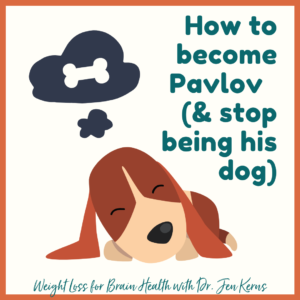We’ve been talking over the past month or two about all of the various reasons why we struggle with overweight. For links to the individual posts about overhunger and overdesire, check out this blog post. Last week we discussed habit-based eating, and specifically, how and why habits form. Our brains want us to seek pleasure, avoid pain, and do it with as little energy expenditure as possible. Forming habits allows us to do all three: putting something on autopilot without having to consciously think about it saves a lot of time and energy. This is great when it’s something we want to be on autopilot, like driving home from work. But when it’s an eating habit in an environment with abundant food, it often does more harm than good. 
So how do we break these habits? We have to stop pairing the trigger with the reward. Over time, with enough practice, our brains stop expecting food in response to various triggers such as time of day or emotions. This is what is called “extinction” in classical conditioning. Ivan Pavlov is famous for his research on classical conditioning, in which he discovered that dogs will learn to salivate in response to neutral stimuli that were paired with food multiple times. He paired various stimuli, including a clicking metronome and the sound of a tone (now often just referred to as a “bell”) with the presentation of food to his experimental dogs, and found that they would eventually salivate in response to the tone even when no food was presented. This is what happens to us when we repeatedly eat food in response to a trigger: we come to expect the food reward automatically. (Feel stressed? Expect ice cream.) The expectation of a food reward can also be referred to as an urge or craving. Pavlov discovered that if he stopped giving food to his dogs when he rang the bell, they eventually stopped salivating in response to the bell — the habit was extinguished. It had to be practiced consistently, though: intermittently rewarding the dogs with food would keep the response intact. We can apply this to our own eating habits: when something like a negative emotion or time of day triggers an urge to eat, we have to first become aware or conscious of this urge (the bell), and then we have to let the urge be there in our bodies without rewarding it with food. Let the bell ring without pairing it with food. Don’t ignore it or distract yourself away from it, just let it be there, ringing. Over time, with consistent practice, our brains will learn that the urge doesn’t necessarily beget the reward, and the urges will quiet down. What at first may feel like a screaming craving will eventually become just a suggestion, a whisper of an urge — one that is much easier to allow to be there, and much less uncomfortable to bear. And one day, with consistent practice, it’s even possible that the urge might completely disappear.
For me, I find that my sensitivity to food reward is quite high. I know that many people advocate eating your favorite rewarding foods in smaller amounts and stopping when you’re satisfied, but I personally find that the regular consumption of sweets just feeds my fire of desire and keeps the urges strong. I have found with experimentation over the past 2 years that I have the most success when I completely eliminate sugar and flour for a period of 4-6 weeks. At first, I have extremely strong cravings for sweets. But when I stick to it, over time my urges settle down, and I can find myself sitting next to a bag of candy and not really notice or care about it. Then, when my desire has calmed down, I can plan in advance to have an occasional sweet treat and eat it successfully without triggering the urges to come back — because I am eating that sweet as a planned meal rather than using the treat to reward an in-the-moment urge or craving. I enjoy the treat without reinforcing a habit. Once I start eating in response to urges (rather than in a planned way), the habit immediately returns without skipping a beat and I’m back to overeating.
Coaching with me involves working to decondition habit-eating and working toward eating nourishing foods to fuel our bodies when we are hungry. It doesn’t mean giving up foods that we love forever, but it does mean only having them in a planned, intentional way. It’s a process. Habit eating doesn’t go away instantly. But with practice, over time, we can learn to be Pavlov and control our eating habits rather than being one of his dogs.
❤️

